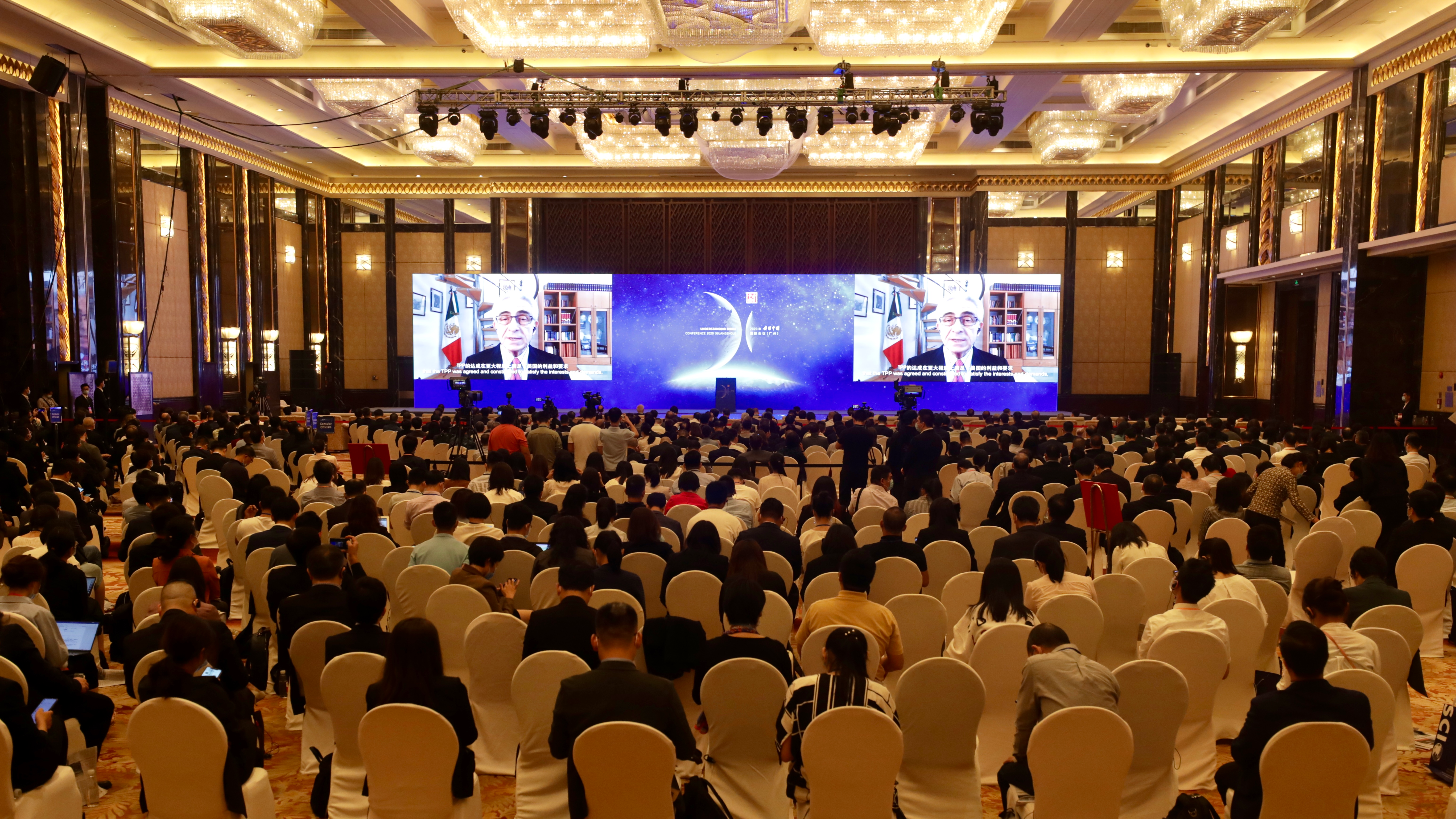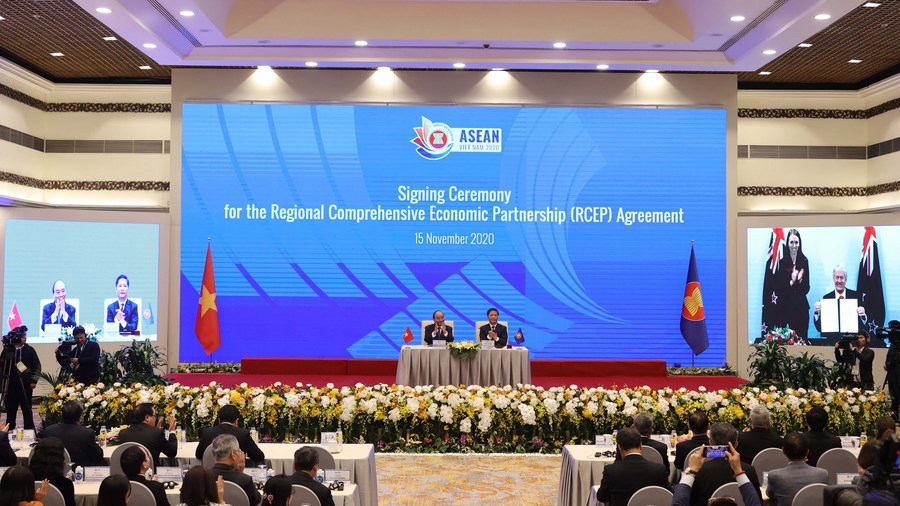17:17

Editor's note: Ernesto Zedillo is former President of Mexico, and Chairman of the 21st Century Council. This is an excerpt of his speech at the Understanding China Conference 2020, held in Guangzhou, China in November. The article reflects the author's opinion, and not necessarily the views of CGTN.
In September of 2003, Kofi Annan famously gave a speech titled "A Fork in the Road." He was deeply worried at the time about the recent events that in his view had indeed put the world at a point where tough choices had to be made.
The UN Secretary General's serious concern essentially stemmed from a reemergence of unilateralism and disregard of international law whose chief expression had been the invasion of Iraq earlier that year.
Annan thought that the unilateral use of force – that is, not properly sanctioned by the Security Council – in reaction to real (or even just perceived) threats such as terrorism or weapons of mass destruction, posed a fundamental challenge to the principles on which, however imperfectly, world peace and stability had rested during almost six decades.
He was raising the alert about a precedent that could result in the unilateral and lawless use of force, with or without justification. That precedent, he warned, would run against the belief in collective answers to our common problems and challenges, and neglected the shared vision of global solidarity and collective security that had been pledged in the Millennium Declaration three years earlier, in September of 2000.
The international rules-based system and certainly its key multilateral institutions have been under an incredibly brutal and unprecedented assault during almost four years. Although there is much blame to go around for the damage inflicted recently to the multilateral system, the United States' share as an aggressor stands-out by far.
The Trump Administration has literally vandalized many of the system's institutions and agreements, which ironically were spearheaded – and used to the United States' own national advantage – since their founding by that very country.
Instances of such assault abound: the withdrawal from the Paris Climate Change Agreement, the UN Human Rights Council and the UNESCO, and the threat to do it from the WHO; the termination of the Intermediate-Range Nuclear Forces Treaty; the refusal to negotiate and join the Global Compact for Migration; the repudiation of the Iran nuclear deal; and the paralysis of the WTO's dispute resolution mechanism.
Although practically all of the Trump government's attacks on the international system can be shown to be against the national interests of the U.S. itself, this result is strikingly evident in the case of Trump's trade policy.

Former President of Mexico speaks at the Understanding China Conference 2020 in Guangzhou, China, November 20, 2020. /CGTN
Former President of Mexico speaks at the Understanding China Conference 2020 in Guangzhou, China, November 20, 2020. /CGTN
Consider for a moment the main components of such policy.
One, the Trump administration aimed to correct the trade (and current account) deficit that for many years has been a feature of the American economy. The wrongheaded approach to pursue this equally wrongheaded goal was to engage aggressively, one by one, the country's main trade partners and force deals supposedly to fix the respective imbalances.
This approach, which not only ignored the basic insights stemming from the essential notion of comparative advantage in its modern version and the basic national income identity, but also conceives of international trade as a bellicose zero-sum game, led the U.S. government to use self-defeating protectionism to try to fix the external imbalance.
The result: The U.S. trade deficit in August reached its highest level in 14 years thus recording for the period of January to August a trade gap of $422 billion, up – despite the dramatic global economic slowdown – almost 6 percent from the equivalent period of last year.
Two, on day three of his administration, Trump withdrew the U.S. from the Trans-Pacific Partnership (TPP) without providing any economic or geopolitical justification for the move. That this action went against the interests of the U.S. is clear from the fact that the TPP was agreed and constructed to satisfy the interests and demands, as well as the standards and practices, of the U.S. to a much greater extent than any previous trade agreement ever subscribed by that country.
The result: Trump's decision caused the U.S. to incur not only a meaningful economic cost but also a substantial loss in geopolitical influence in a critical part of the world. Furthermore, the eleven remaining partners slightly modified the TPP agreement and signed it in March 2018.
Interestingly too, a few days ago – on November 15, the Regional Comprehensive Economic Partnership, or RCEP was formally signed. It is an agreement among China and 14 other nations from Japan to New Zealand to Myanmar. This pact was spearheaded by China purportedly, in the view of some observers, as a counterweight to American influence in the region. The successful negotiation of this pact, which is now the largest free trade agreement in the world, truly highlights Trump's inanity of dropping, for no good reason for U.S. interests, the TPP.

The signing ceremony of the Regional Comprehensive Economic Partnership (RCEP) agreement is held via video conference in Hanoi, capital of Vietnam, November 15, 2020. /Getty
The signing ceremony of the Regional Comprehensive Economic Partnership (RCEP) agreement is held via video conference in Hanoi, capital of Vietnam, November 15, 2020. /Getty
Three, based on fallacious arguments, Trump forced Mexico and Canada to renegotiate NAFTA. Although his negotiators did not get all the rather awkward demands they maintained throughout most of the talks, they did get an agreement, now called the USMCA. This, for the most part, by diminishing the region's competitiveness in global markets, is inferior to the old NAFTA.
The result: with the USMCA, both Mexico and Canada lose, but so does the U.S.
Four, the Trump administration, by blocking the appointment of new members of the Appellate Body of the Dispute Settlement mechanism, has crippled the WTO. To justify his animosity towards the WTO, Trump has argued that his country loses almost all lawsuits and that the system has been "terrible" for the U.S.
The facts: The U.S. is the most frequent user of the dispute settlement system, having brought to it more cases than China and the EU combined, and the U.S. has a higher proportion of cases won (91 percent) than the rest of the complainants. No serious analysis has ever produced evidence of bias against the U.S.
Almost always one of the judges of the appellate body has been an American, a circumstance not enjoyed by any other country.
What traditionally has upset American officials is to lose cases brought against U.S. trade remedy actions (antidumping and countervailing duties).
It is clear, however, that those complaints are caused first and foremost by the U.S.' own aggressive use of such remedy actions that plainly violate the rules agreed at the WTO – rules certainly accepted by the U.S. itself.
The result: one of the best and most useful multilateral institutions, the WTO, has been left in a state of hibernation by the courtesy of the Trump government.
Five, initiating unjustified trade wars has been the most egregious trade policy by the Trump administration. It did so against its "friendly" trade partners like Canada, Mexico, Brazil and the European countries, by imposing tariffs arbitrarily on imports of products such as steel and aluminum on the grounds that they constitute a threat to the country's national security. The illegality of this action was flagrant – as was opined immediately by many experts.
Still, the unwarranted and abusive treatment of its "friendly" trade partners pales in comparison to the trade aggressiveness displayed by the U.S. government against China. Step by step, although rather quickly, the Trump administration set off an authentic trade war practically without precedent since the 1930s.
Regretfully, but not surprisingly, China responded in kind. The clock of these two countries' trade cooperation and interdependence has been set back many years.
Every serious legal and economic analysis of the arguments provided by the U.S. government to justify its massive trade attacks on China have found the alleged American justification questionable in the best of cases – if not patently illegal.
The result: The U.S. has not won the trade war initiated by Trump – actually, there are never winners in these kinds of episodes, and it has been left to the American consumers, farmers and taxpayers to suffer the folly of Trump's acute trade bellicosity against China.
The ill-fated events of recent years have led to a boom in the dubious occupation of predicting unavoidable fatalities. Concepts such as the Thucydides Trap or the Cold War have been given a renaissance by pundits of geopolitics.
Much ink has been spent in describing the inevitable confrontations to come, including the military ones, rather than denouncing the folly of the tit-for-tat game being irresponsibly played by global powers.

An autoworker holds a sign that reads "We Don't Want Tariffs" during a news conference on Capitol Hill in Washington, DC, U.S., July 19, 2018. /VCG
An autoworker holds a sign that reads "We Don't Want Tariffs" during a news conference on Capitol Hill in Washington, DC, U.S., July 19, 2018. /VCG
That is how the world has arrived at a 2021-vintage Fork in the Road situation, a much more challenging circumstance than the one described by Kofi Annan in 2003.
The global powers can choose to move forward along the path that in all likelihood would lead to disaster. This path is about dismissing the rules-based international system; neglecting the value of international cooperation; reaffirming unilateral, or at best bilateral, approaches to address issues of truly collective interest; expending on military capabilities instead of on diplomacy and human well-being; continuing to blame "the others" and interdependence for the social consequences of essentially homegrown policy failures; continuing to look at international trade, investment, and migration as zero sum games; in short, proceeding to undo the positive aspects of the world order painstakingly constructed only after the shameful experiences (two world wars and a great depression) suffered in the first half of the 20th century.
Staying on this path could lead to a repetition, or even much worse, of past episodes of immense, unnecessary and unjust human suffering.
All the global powers, joined decisively by enlightened emerging countries, can decide to work together on the other path where international peace and prosperity, which are good for every country, if not guaranteed, indeed constitute the most probable outcome.
Needless to say, moving on that path, despite its promise, will not be easy. For one thing, inertia towards the other direction has gained significant momentum in recent years. The adversarial view of the world has become influential even among otherwise cosmopolitan citizens of open societies.
Repairing the damage suffered by international relations and cooperation will be a work of patience, diplomatic craftsmanship and slow recovery of mutual trust.
But let me emphasize that although the United States has been the worst offender during the Trump administration, the reconstruction and improvement of the system requires the goodwill and effort of all the other stakeholders.
Of course, the Biden government must proceed decisively to repair the most egregious misdeeds of the outgoing U.S. government, as already committed by the President-elect himself.
Observing the U.S. return to the international agreements and institutions repudiated by Mr. Trump will be not only a source of relief to the rest of the world but also a firm step towards the restoration of the country's leadership and respectability.
However, great responsibility rests with others.
This is certainly the case for China.
(If you want to contribute and have specific expertise, please contact us at opinions@cgtn.com.)

